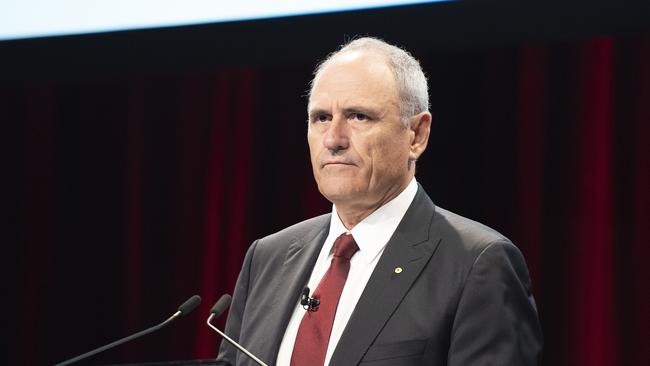Why the nation needed Ken Henry to succeed
Ken Henry’s professional trajectory, up and down, raises vitally important questions of national interest and governance.

For a humiliated, alienated and disgraced NAB, the departure of its chairman and chief executive in the same breath has national interest implications far beyond the mere implosion of leadership.
Leaving to one side the obvious global opprobrium towards NAB and to “brand Australia” in the wake of the royal commission findings, Ken Henry’s professional trajectory, up and down, raises vitally important questions of national interest and governance.
It is widely accepted that Henry was one of our most accomplished mandarins ever to serve successive governments. As former Treasury secretary, and in a great many other senior government roles, he has been at the heart of national affairs for more than a quarter of a century.
Henry competently steered the nation through the global financial crisis (despite claims it was all due to the mastery of Kevin Rudd and Wayne Swan) and he led the national tax review — the findings of which were released in 2010. The latter proved costly to Henry and ultimately to the Rudd government, sparking trench warfare from the mining sector, leading to the eventual departure of Rudd as PM.
In 2011, Henry was appointed “special adviser” to then PM, Julia Gillard. In accepting the role, he appeared to append himself strongly to the Labor cause and he’d crossed the line of political independence as a public servant.
In a move that many regarded as “brave”, Henry was appointed, in that same year, as a non-executive director of NAB. By 2015, the board had thought sufficiently highly of Henry to appoint him chairman. The former economist and Treasury secretary now sat at the head of one the nation’s largest corporations. The rest, as they say, is well-documented history.
Many senior leaders in business, industry, the public service and academia are convinced Australia cannot hope to achieve anything approaching its potential unless there is a much more co-operative spirit among each of these sectors.
The national interest is not well served by a faltering Council of Australian Governments (COAG), mainly because political enmities make progress virtually impossible and personal animosities run deep. Nor, sadly, is it well served by a slew of entrenched lobby groups who simply throw verbal mud at each other and call it a day’s work.
The nation needs people of Ken Henry’s stature and experience to succeed.
There remains a yawning chasm of understanding between the private, public and academic sectors. The breathtaking ignorance in parts of business as to the role of government, its mechanisms and its motivations is, and should be, a matter of deep concern to all policy makers.
Other senior public servants have made the transition — with Sir Lenox Hewitt showing the way back in 1975, when he took up the chairmanship of Qantas, a position he held for five years, after which he held several other significant directorships to the betterment of Australia. Others have followed but not in anything like sufficient numbers.
The flow of senior talent should not, of course, all be one way. It is to Australia’s great detriment that the practice of seconding staff from the private sector into the public sector has slowed to almost a trickle. Some of the nation’s largest employers regularly seconded up-and-coming talent back in the 1970s, 80s and 90s. The practice should be recommenced in a bid to encourage urgently needed awareness and understanding between the sectors.
Australia’s policy agenda, such as it presently is, cannot hope to approximate any semblance of cohesive form unless the wise heads within the public, private and academic sectors find ways of working together in ways that are constructive, meaningful and enduring.
In this, personalities matter and while Thorburn may have departed NAB for different reasons, Henry’s personal traits of arrogance, aloofness and self-importance seem to lie at the heart of his departure from NAB — even by his own admission.
Personal attributes, along with interpersonal skills, matter today more than ever, as customers, shareholders (large and small), employees, and a plethora of stakeholders examine every utterance, move and decision for signals in one direction or another.
Henry blew his opportunity to use his privileged private sector position for the betterment of the nation. It could have been otherwise.
Those who seek to walk the treacherous path from the public to the private sector, after Henry, will find the going that much tougher following the spectacular events of last week. The national interest has not been served as a consequence.
John Simpson is governance adviser and Member of Council at Monash University, and former general manager of corporate affairs at National Australia Bank.



To join the conversation, please log in. Don't have an account? Register
Join the conversation, you are commenting as Logout